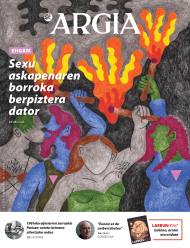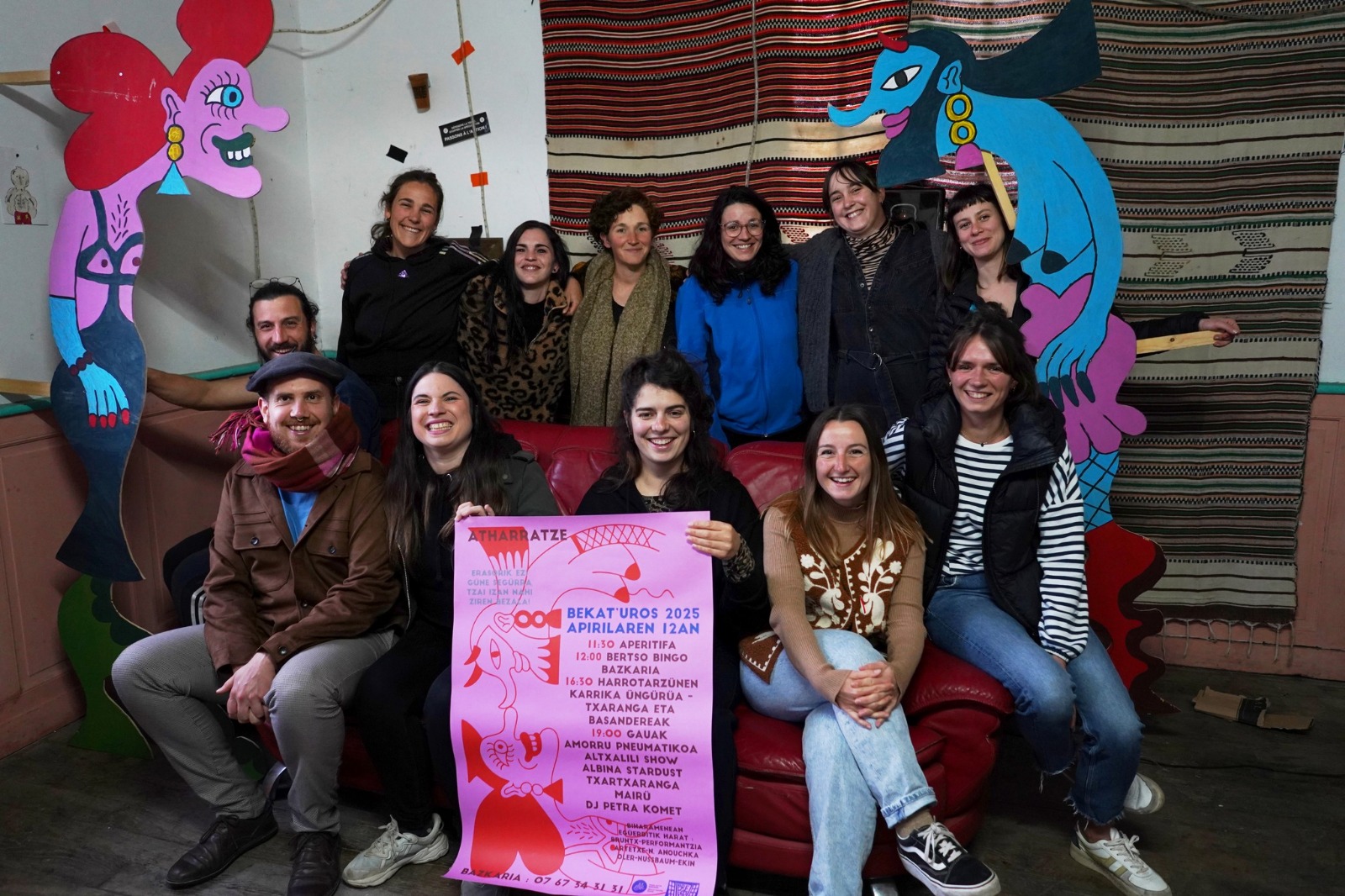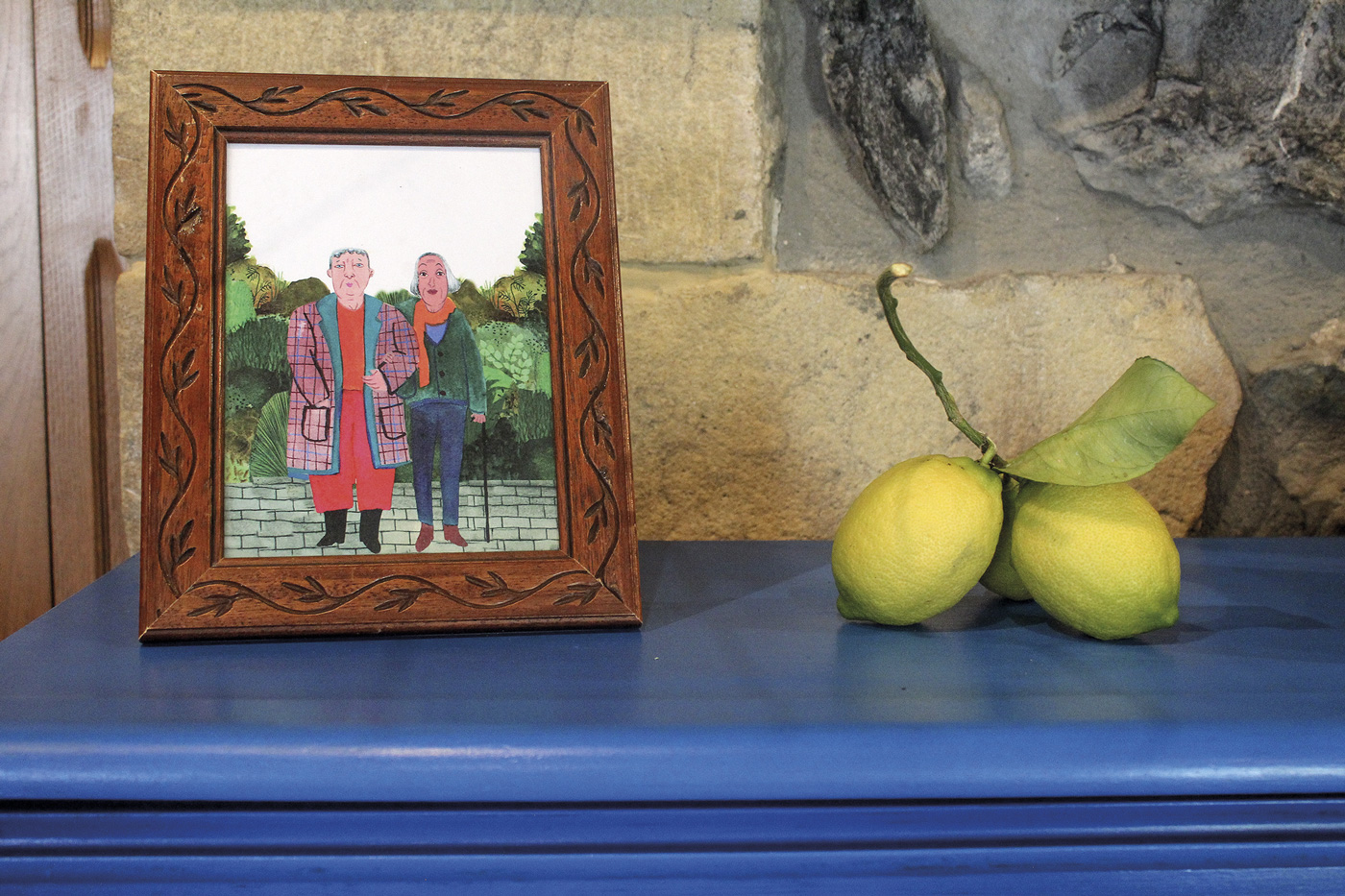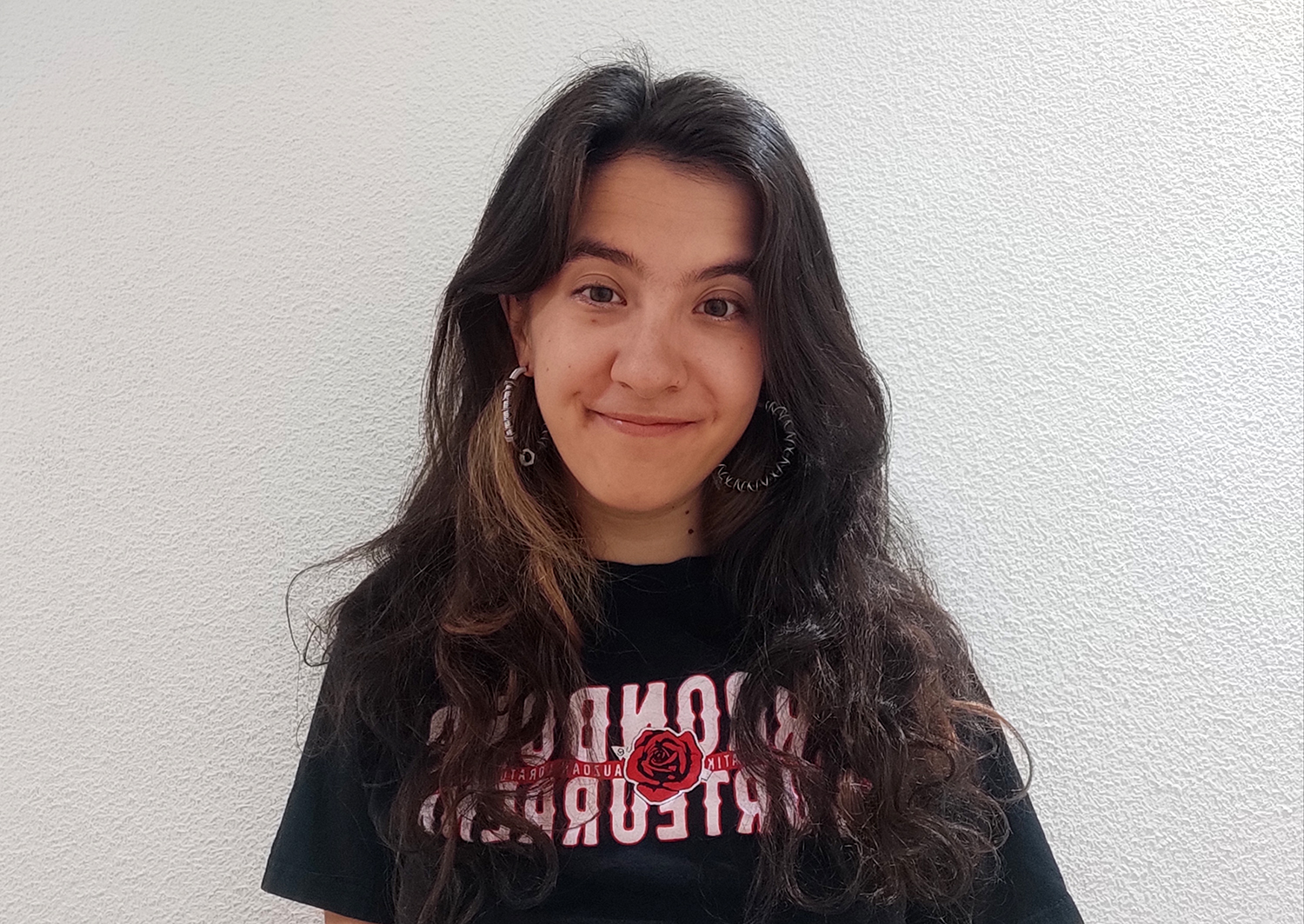Rearming the Sexual Revolution
- When he was about to shut down, Ehgam has returned the witness to younger generations and has risen, a pioneer in the fight for sexual liberation. In these times when the Gorroto discourses have gained legitimacy, the movement has embarked on a transition to innovate and be more plural. And that is, although the heteronorma has opened the door a little during these years to those who abandon it, it is nothing but an illusion, "the system still leaves out those who do not cross the door or do not want to cross it."

Tired, unactive and unable to reach young people, Ehgama's historic members looked at themselves. Jaime Mendia, who has been campaigning for sexual liberation for about 30 years, tells us that they thought of leaving the movement off, “but it has suddenly been an opportunity to resurrect Ehgam and we are very proud.”
Amets Jordan Arrieta is one of the members who takes the witness: “We couldn’t let the movement that has travelled that way die.” It was the first group that emerged in Euskal Herria after Franco, 45 years ago, related to sexual liberation. They met in Durango in 1976 to dream of what would then be Ehgam. He was born a few months later, for lack of legality. Jordan has highlighted the doors and networks it has opened over these years: “The movement has a name, it has a place made, we do not start from scratch and we want to recover the referentiality”.
They've inherited years of work. “The most recent are able to discuss and decide how to move forward,” says Jaime Mendia, “what we can give them is our story, what we have done and how we have done it. Like any social movement, sometimes we've been strong, bor-bor, and other times weaker. In the early days after Franco, people were very active, there were more people in the closet than today, yes, the visibility of the collective was lower, but those that were very active, politicized people, willing to face it, even though they knew it was illegal, even though they knew the police was going to touch it. The 1990s was also particularly passionate, resulting in a very high marriage between people of the same sex. And once this was achieved, little by little the involvement of the people began to blur. Now, the rise of the messages of the extreme right and of the messages of hatred requires a revival, the resurrection of Ehgam by the young generations, because we are not in the time to respond.”
A. Jordan: "Some people have a certain sense that being intolerant ideas is sharing ideas from the extreme right as if it were a rebel or a punch against the system."
Why now?
“Many times it seems to us that we always move forward, but the steps taken are not definitive achievements, we can go back if there is no radical change,” Jordan warns. We are talking about the prominence of homophobic and transphobic attacks in recent times. There are those who say that there is a higher level of awareness today and that more is being denounced, that there was aggression before. Others, however, look with concern at the current situation and Jordan highlights what he has heard from people in school on a day-to-day basis: “In educational centers there is a great legitimacy to say barbarities, a setback is noticeable. I think we have to be careful because they can be thoughts and behaviors that already existed before, but when you allow to make several public statements disguised by the phrase ‘it’s my opinion’, a dangerous path opens. Some people also have a sense that being intolerant ideas means going against the system, acting against the current, spreading the ideas on the right tip as if it were a rebel or a punk. That is dangerous!”
Jordan Arrieta underlines the dissonance that exists between what people think in general and reality. It is believed that equality has been achieved and that in Euskal Herria we are very tolerant, “it is homophobic what gay, without realizing that we all have homophobic attitudes as we have grown up in a heteronormalized society. People think ‘You have rights and I accept you’, but in daily life there are many dynamics that exclude me because of my sexual orientation or that cause me a lot of pain, for example in the case of transgender people.”
“Before, we had a lot of people outside the borders that society put in,” says Jaime Mendia. Since then they have opened a little door and told us, ‘if you want to be like us, enter and live like us’, but whoever wants or cannot go on outside. We believe that ours is a liberalized society, and what I see is a small door that has only opened a little bit.” There is also a sexual liberation movement for those who have crossed the door, because those inside often have to sacrifice a lot of things to be accepted. “We have believed that entering the hegemonic culture will make us happier, that not entering will be living worse,” says Jordan.
A. Jordan: "It seems to me that the LGBT imaginary built with Instagramen is very normative. Faced with this, it is important to offer a discourse of its own, close and located in real life"
Collective X-ray: Dispersed and depoliticized?If it has been
depoliticized, individualized, dispersed to a person when opening the portillo and transposing the LGBTIQ+ community to its standards. That's how Mendia feels. Jordan Arrieta, Madrid, Barcelona, tells us about the idealization of big cities so that, being sexilized to London, they become more sexually free and happier in those places, often leaving friends and family, condemning themselves to precarious jobs and expensive rentals. “But if we are here and we have to create networks here.” And it relates to face-to-face networks, bone meat. “Today the visibility of LGBT people is greater, but at the same time it seems to me that the LGBT imaginary built on Instagram is very normative and heteronormalized. The relationships that occur on the Internet occur on large platforms, and these companies, if they can depoliticize the discourse, will depoliticize it. Faced with this capitalist and neoliberal message, it is important to offer a local discourse close and in real life. Ehgama wants to be a space to create our spaces, a space to feel safe and share our experiences, but we don’t just want to be a place to serve people, we want to fight, be present in the political debate and influence.”
Young generations will play a key role in this. “When we talk about young people, we should talk about the inability we sometimes have to see what their needs are, where their struggles are raised. There are many social movements that we adults don't understand -- Jordan confesses. We'd like to catalyze all of them in Ehgam to be part of a revolutionary movement. And when I told them this, what I've gathered is that there are many young people who want to participate."
Since its inception, Ehgama
has had a clear discourse on the liberation of stigmatized, precarious, undervalued and marginalized sexualities and pathological bodies, but instead of focusing on certain sexual identities, our interlocutors have reminded us that the sexual revolution is for the whole of society, and that the objective is the same structure, the patriarchal cyst structure that produces oppression: “Our ultimate goal is not to leave so many identities in society and tolerate them, but to question the same structure that will continue to generate violence and leave people always on the periphery, because the system needs even abnormal to create the normal,” Jordan explains. In this sense, Ehgama has a clear message about homophobic and transphobic attacks: the key does not lie in the sexual identity of the victim, but in the aggressor and in the system that allows his/her behavior: “They are heterosexual, macho, homophobic and transphobic men, protected by patriarchy.”
They have to question the structure, but in the day-to-day life we have to make politics, gain spaces with the resources and opportunities that exist. Jaime Mendia has given a significant example. The right to marry between equals was claimed for years and years by Ehgama, who was finally legalized by the government, and then, once the right was achieved, the movement began to criticize the marriage, not the right, but the concept of marriage, since marriage should not be the way to determine the love or the relationship of a couple, it should not give more rights to the couple because they are married. In the current system, however, it does, so homoparental couples must be given the opportunity to use this tool. “We must act with the dichotomy of the work we do discursively and of what we have to ask for at every moment.”
J. Monte: "The other freedoms have to be accompanied by sexual liberation; together we all have to achieve a freer society, although each one exerts its strength in a certain area"
This is not only the home of white gays Asked about the challenges facing
the future, they talk about visibility, influence in the political debate, keep it active in daily life. Not in vain, by naming them, they put the “movement” well thought out and not the “association”, because from the beginning they were clear that they wanted to move things, shake society. At this new stage, the main challenges still have to be defined, precisely because they want to make this roadmap together with the new people that will come. “We are in the middle of the transition phase and our commitment is to question and attract as many people as possible, to open the movement, to be more plural, to bring new speeches to us… Because many will relate Ehgam to the gay man, with that idea we want to break, we want to be a movement that feels all the collective,” Jordan explained. That is why those of us who met at the beginning could not present Ehgam closed, we are going to define with all the diversity that we hope to come. We would like to be able to articulate the proposals that the people who come together and those around us, the networks and alliances they undertake, the spaces they want to set in motion … and that is what the people who come and their motivations will mark”.
In the same sense, they have no doubt that alliances are going to be fundamental, because they have stressed that Ehgam has worked from the beginning with other popular movements, with unemployed workers, with works councils, with students, with women’s assemblies, with Euskaltzales, with associations of neighbors, with objectors and passions… “The other freedoms have to go along with sexual liberation; all together we have to achieve a freer society.
With the institutions, contradictions To what extent can we trust the administration when we talk about transformation? Jordan Arrieta says that laws are an important instrument, but that in order to achieve radical changes they have to work outside the administration, to force society itself into transformation.
Jaime Mendia has a great experience in the relationship with the administration, with which Ehgam has collaborated on numerous occasions to eliminate unfair laws, to treat LGBT issues in people’s prisons, to manage the situation when AIDS emerged… And he believes that he needs it, but when it comes to it politicians frighten him all, that he takes them to his field, that he uses them for his purposes… The example: Ehgama asked the Basque Government for a service like Emakunde, “and the result has been Berdindu! service, fully economized and entrepreneurial platform”.
The transition process
initiated by Ehgama is called Post-Coronavirus Sexual Liberation KOSA. On the one hand, it is a question of attracting new people and starting to reflect together on the future of Ehgam, at an event organised on 6 November in the self-managed space Karmela in Bilbao. On the other hand, on the same day, both in Carmen and in other villages, round tables and collective interviews have been organized to discuss themes and reflections on how to act in the face of aggression, the place of Euskera in LGBT+ struggles, gender dissidents, etc.
In the debate “Families and cribs outside the cishetero” will take part, for example, Nel Santastre. We have been told that a great key to the round table will be to transform and broaden our family imaginary, because the legitimacy of having a child and growing resides in the cysheterosexual couples in our society, “and those who come out of this framework face social, legal and institutional obstacles”. Santaar is a transsexual father who has given birth to a child and who, in addition to the multiple family models, talks about the growth of children, about the practices and ways of not being educated in heteronorma. “In my case, I did not want to gender the child to explore the gender and not be imposed according to the genitals he has at birth (clothing, games, values…).”
The round table “Non-heteronormalized culture” will be attended by the writer Danele Sarriugarte. He has explained that among the topics to be addressed are the visibility, that of LGBT creators, but also the visibility and representation of the community in cultural productions. They also have several questions on the table: Is there – and we want – a subculture linked to the LGBT community? To what extent does the dominant culture take advantage of the currents generated in LGBT culture, and how do we live it? What are the cultural references related to the community? What relationship – historical – does the movement have with feminism?...
Ehgama has everything ready to start reimagining, rethinking, rearming and rethinking the roadmap for sexual revolution.
.jpg)
The Leioa School of Education was full of students last Wednesday because Samantha Hudson was coming. She is a transgender Mallorcan artist, singer and influencer born in 1999. The star of the People Singing Encounters had an endless line to give selfies and autographs, and his... [+]
1984an ‘Bizitza Nola Badoan’ lehen poema liburua (Maiatz) argitaratu zuenetik hainbat poema-liburu, narrazio eta eleberri argitaratu ditu Itxaro Borda idazleak. 2024an argitaratu zuen azken lana, ‘Itzalen tektonika’ (SUSA), eta egunero zutabea idazten du... [+]

























